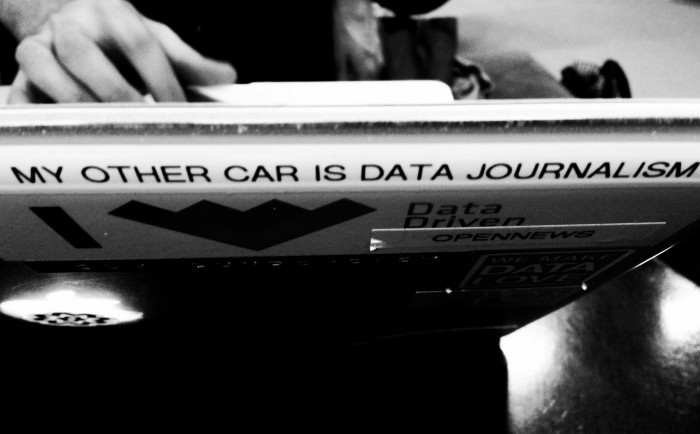
The fifth class of Knight-Mozilla fellows have been announced at the Mozilla Festival in London, a group of data and design geeks and developers who’ll work for ten months next year on projects in newsrooms around the world. The fellows are a diverse bunch, including a game developer (who was behind the interactive game Coming Out Simulator 2014), a software developer who created this video clip transcription tool, a few data journalists, and a research analyst from the Brookings Institute.
The fellows are part of the Knight-Mozilla OpenNews project, led by Dan Sinker, and their mission has always been to work with newsrooms to perform research, write open-source code, and help develop projects — whether brand new ones or ones already in the works — all in the name of addressing the problems journalism faces today. Starting early next year, the fellows will not only work closely with their host newsrooms, but can also travel, speak, teach, and engage with the rest of the journalism-code community. This year’s partner newsrooms, which will host the fellows, include new participants Frontline, the Los Angeles Times, and the German investigative nonprofit CORRECT!V, as well as a few returning organizations, NPR, Vox, and The Coral Project, which is a joint Mozilla, New York Times, and Washington Post initiative. (Thirty-six organizations applied for three open host newsroom slots; a few organizations stay on from the previous year to maintain some institutional memory, Sinker said.)The original plan was to choose five fellows a year, Sinker said. But with 560 applicants this year and far more organizations wanting to host than available fellows, “growth is pretty much inevitable.”
Two years ago, the Knight Foundation, which jointly supports OpenNews with Mozilla, invested another $4 million in the program over three years, allowing it to continue funding fellows, but also to grow in scope. (Disclosure: Knight is also a funder of Nieman Lab.)
The bios of the 2016 fellows are below.
Nicky Case (Frontline) plays with play. They make interactive explanations, to help people understand the world, and interactive stories, to help people understand themselves. Last year, Nicky made Coming Out Simulator, an autobiographical interactive story about their experience coming out as queer. It was nominated for Best Narrative at the 2015 Independent Games Festival. After that, they made a few interactives to explain math, psychology, and sociology. Most notably, they collaborated with Vi Hart to make Parable of the Polygons, a playable blog post about bias and diversity. Nicky still thinks writing about oneself in the third person is really weird.
Sandhya Kambhampati (CORRECT!V) is a data journalist who is passionate about open records, data literacy and statistics. At The Chronicle of Higher Education, she analyzes data and reports on college athletics, college presidential pay, and student loans. She’s interested in records retention policies and finding new ways for newsrooms to share their institutional knowledge with others. In her spare time, Sandhya enjoys traveling, reading and trivia. She’s especially excited to learn German and about the Freedom of Information laws throughout Europe while working with the journalists at Correct!v.
Pietro Passarelli (Vox) is a software developer and documentary filmmaker. He is passionate about projects that sit at the intersection between software development and video production, both in terms of the growing trend of interactive documentaries but also as tools for making video production and post-production easier, such as autoEdit. While working in broadcast documentaries for BBC and C4 Pietro noticed the convergence of video production and software development and did an MSc in Computer Science at UCL. Recently, he worked as newsroom developer at the Times & Sunday Times where he developed quickQuote an open-source project to make it easier and faster for journalists to identify and create an interactive video quote.
Lisa Charlotte Rost (NPR) is a designer who loves numbers, systems, and overviews. She wants to help the world to make sense of itself—to destroy false belief systems and to help people ask the most important questions—by using data visualization and data journalism. Lisa has worked for newsrooms like Bloomberg Businessweek, SPIEGEL, and ZEIT Online. She has taught data visualization at several German universities and organizes the Data Vis Meetup in Berlin. Lisa will be a fellow with the NPR Visuals team in Washington, DC, where she will learn how to make people care.
Martin Shelton (The Coral Project) is a user researcher and data analyst interested in online privacy and security for at-risk users. His research focuses on the privacy habits of users in online communities, as well as journalists and activists. He is completing his PhD at UC Irvine’s Department of Informatics, where he studies how investigative journalists manage their information security. During his PhD, he worked as an intern conducting UX research and data analytics with Twitter, the Pew Research Center, and Google. Martin will be a fellow at the Coral Project, a collaboration between the New York Times, the Washington Post, and Knight-Mozilla OpenNews.
Dan Iair Zajdband (The Coral Project) is a software developer passionate about real-time technologies, open-source projects, and open journalism. He contributes to a wide diversity of open source projects including both tooling and end-user software. He helps build community around web development and journalism by participating in and organizing groups like BAFrontend and Hacks/Hackers Buenos Aires. Dan will be a fellow at the Coral Project, creating open-source tools and resources for publishers around the world.
Christine Zhang (Los Angeles Times) is a data geek with a passion to find meaning in numbers. She believes that good data journalism can take us from “more-informed” to “better-informed.” Her aim? To tell meaningful news stories with data, and to use open data and open-source tools to empower her readers to ask their own questions. Christine currently tells data-driven stories about the global economy at the Brookings Institution in Washington, DC and has previously done so in roles at Deutsche Bank and Infosys. Christine will be joining the team of news nerds on the LA Times Data Desk in 2016.